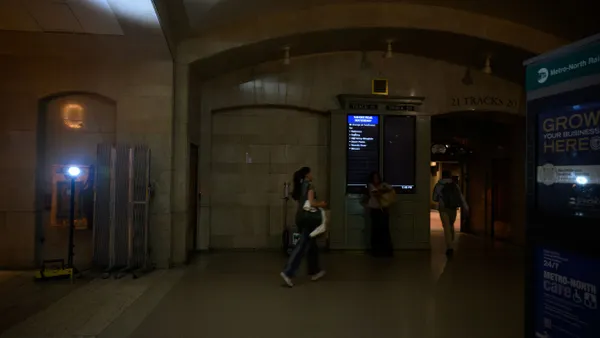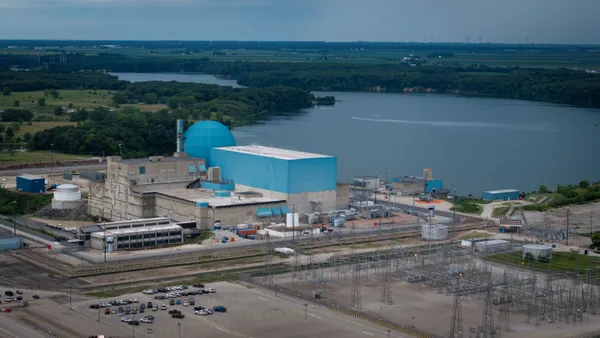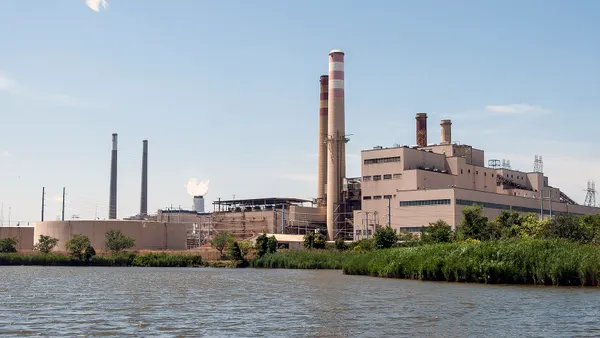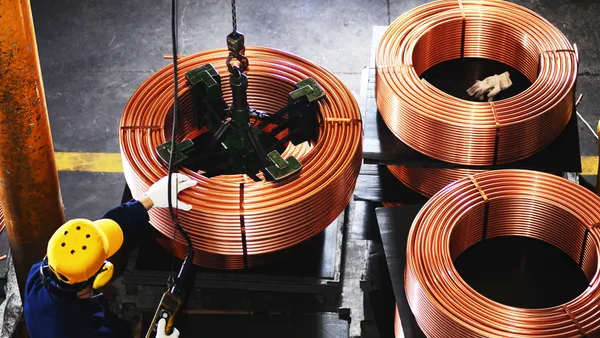Dive Brief:
- The Federal Energy Regulatory Commission late Wednesday reissued construction certificates for three pipeline projects the D.C. Circuit Court had threatened to put on hold due to the agency's greenhouse gas accounting.
- In a 3-2 vote, the FERC majority said that despite a new environmental impact analysis, the agency "could not reach a finding" as to whether climate impacts of the project would be significant. Commissioners Cheryl LaFleur and Richard Glick, the two Democrats on the commission, dissented.
- The decision comes after the D.C. Circuit vacated FERC's earlier approval of the projects, ruling the agency must issue a new supplemental environmental impact statement (SEIS) that considers greenhouse gas emissions. FERC issued the new SEIS in February, but had not yet reissued certificates for construction to continue.
Dive Insight:
FERC's decision to allow construction to continue on the SMP projects reflects its rationale for its reissued supplemental EIS — that regulators cannot determine if the greenhouse gas impacts of the project will be significant.
"Commission staff concluded that notwithstanding the additional analysis in the SEIS, it could not reach a finding whether downstream GHG emissions are significant and that the additional analysis does not alter staff’s conclusion in the prior final environmental impact statement that the SMP Project is an environmentally acceptable action," the majority wrote.
FERC's decision comes after a series of legal rulings that nearly shut down construction and operation of the pipelines, including the 515-mile Sabal Trail project from Alabama to Florida.
In late January, the D.C. Circuit declined to revisit an August ruling that rejected FERC's approval of SMP on the grounds that the agency should have given a "quantitative estimate" of the greenhouse gas emissions that would result from burning gas transported in the pipelines, or explain why it cannot.
That ruling would have halted operations on the pipelines when codified in a formal decision, but FERC petitioned the judges to delay issuing that document until it could release the new SEIS and reissue construction certificates. The court granted that request last week, and FERC's decision ensures construction and operation will continue.
In two strongly worded dissents, LaFleur and Glick called FERC's greenhouse gas conclusions into question.
LaFleur wrote that she supported approval of the SMP projects because they are "needed to deliver gas to four downstream power plant customers." But she strongly opposed the majority's conclusion that it could not determine if GHG impacts would be significant.
"I reject the contention that the Commission is unable to discern the significance of GHG emissions," LaFleur wrote in her partial dissent. "We are required by [the National Environmental Policy Act] to reach a determination regarding the significance of all environmental impacts, including downstream GHG emissions. It is our responsibility to use the best information we have to make that determination."
LaFleur said FERC could measure greenhouse gas impacts by "comparing the gross and net GHG emissions of the SMP Project to the total state and national emission inventories." This, she wrote, would show that SMP would result in a 3.6% increase in Florida GHG emissions — a finding LaFleur called "significant," but not a dealbreaker for the project.
"Due to the need of the project, I believe that increase is acceptable but should be disclosed and assessed," she wrote.
Both LaFleur and Glick rejected the majority's opinion that the Social Cost of Carbon — an estimate of climate impacts of GHG emissions developed by the Obama administration — is not useful for pipeline reviews. FERC has held in the past that the measurement includes too many assumptions and unknown variables, but the Democrats wrote FERC should then aim to improve the measurement, not ignore it.
"I believe that the best way to address climate change and the Social Cost of Carbon in pipeline dockets would be for the Commission to develop a more complete record on costs and benefits of the proposed project, including more information on the need for a project, the likely end-uses of the transported gas, and the alternatives," LaFleur wrote.
While LaFleur's partial dissent still supported the SMP project's construction, Glick issued a full dissent saying the commission had disregarded the D.C. Circuit's ruling on the project.
"The Sabal Trail [ruling] leaves no room to question that 'greenhouse-gas emissions are an indirect effect of authorizing this project, which FERC could reasonably foresee, and which the agency has legal authority to mitigate,'" Glick wrote. "Nevertheless, the Commission, through today’s order, is engaging in a collateral attack on the Court’s decision by suggesting that it is not the Commission’s 'job' to consider whether emissions from 'the end use of the gas would be too harmful to the environment.'"
Refusal to more seriously consider GHGs could open FERC up to court challenges, Glick wrote, calling the decision "arbitrary and capricious" — the legal standard a party must prove to get a FERC order vacated in court.
"Rejecting [the Social Cost of Carbon] tool on the grounds that the Commission has 'no basis for determining the significance' of the impact amounts is arbitrary and capricious, given that the Commission relies on similar analysis elsewhere in the EIS," Glick wrote.
The SMP order represents FERC's second 3-2 vote in less than a week, after Commissioner Glick and Robert Powelson dissented on a ruling to approve capacity auction reforms in ISO-NE. It was quickly followed by another: FERC in its Thursday meeting also approved the 44-mile DTE Midstream Appalachia pipeline in a 3-2 vote, with Glick and LaFleur again issuing dissents.













